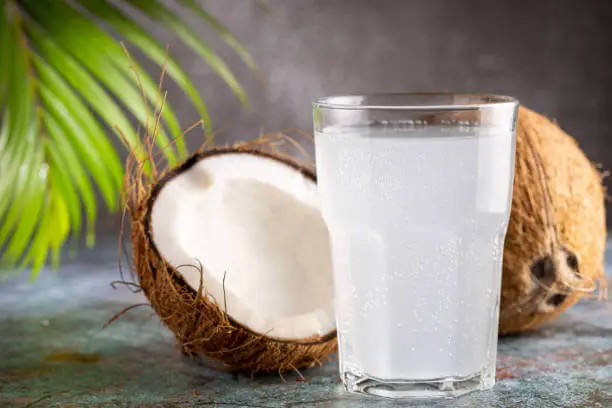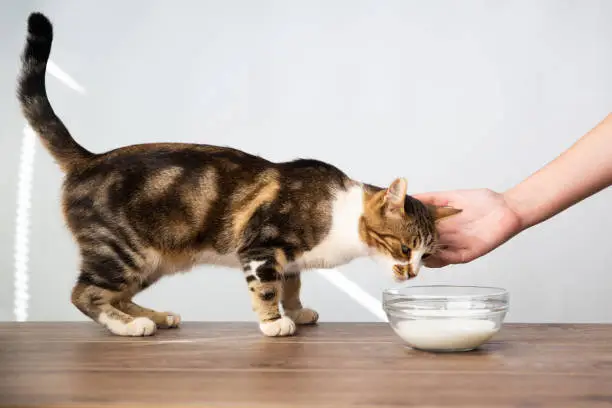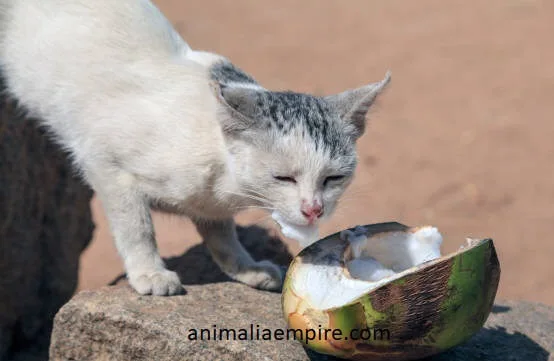As pet owners, we often share bits of human food or drinks with our begging feline friends. But when it comes to the latest health craze coconut water. Should we oblige those pleading cat cries? Or does this popular potation pose risks for cats that we may not realize?
can cats drink coconut water? or does this hydrating potion hide dire risks for felines? Vet-approved guidance include easily available best waters for cats.
Can Cats Drink Coconut Water?
Can cats drink coconut water too? This new health sensation has left cat owners perplexed. Essentially, coconut water provides hydration from the inside of young coconuts.
While revitalizing for humans, is coconut safe/ok for cats to enjoy those same benefits? Let’s dig deeper to uncover the truth.
What Exactly is Coconut Water?
Before determining if it’s safe for cats, let’s start by understanding what coconut water actually is:
As its name denotes, coconut water derives directly from the interior liquid of young, green coconuts – those furry brown drupes often imagined floating lazily in island paradises.

Not to be confused with milky white coconut milk used abundantly in cuisines worldwide, coconut water in its pure form undergoes no processing or added ingredients.It’s just the fresh juice tapped straight from coconuts.
So what exactly does this au naturel beverage contain that has elevated its status to a top health drink trend?
- Potassium – With a higher concentration than 4 bananas, coconut water packs an electrolyte punch for full-body rehydration.
- Sodium & Magnesium – Two additional electrolytes essential for energy, muscle and nerve function.
- Antioxidant Vitamins – Immunity superstars like vitamin C battle infection and disease.
- Calcium and More – Bone-building minerals also support heart and digestive health.
With a pleasantly sweet taste yet low in calories, it’s no wonder fitness fanatics and health-conscious consumers have developed a passion for coconut water bordering on addiction!
So in essence, unprocessed coconut water is the juice naturally occurring in coconuts. Now let’s explore its potential cat health benefits and risks further.
Benefits of Coconut Water for Cats
While not essential, coconut water can provide benefits when given properly to cats. Main advantages include:
- Helps rehydrate and replenish fluids due to electrolyte content like potassium
- Initial research found coconut water rehydrated human athletes better than sports drinks
- May boost hydration in cats prone to dehydration
Immune System Support
- Antioxidants help fight cellular damage and infection risks
- Vitamin C and minerals boost immunity health
Heart Health
- Potassium regulates blood pressure and supports heart function
So for cats needing an hydration boost alongside nutrients, coconut water can offer wholesome properties with vet monitoring. But it’s not all positive when it comes to cats and coconut water.
Risks and Side Effects for Cats
While coconut water may seem like a healthy treat, risks also exist when giving it to cats
Are cats allergic to coconut? Yes, allergies are possible ranging from mild to severe
Digestive Troubles
⦁ High fiber and sugar quantities can lead to diarrhea or upset stomach
⦁ Too much can cause painful gas or intestinal distress
Unhealthy Weight Gain
⦁ Unused calories get stored as fat which cats cannot process well
⦁ Excess carbohydrates also lead to weight gain in cats
Nutritional Imbalances
⦁ As carnivores, cats require specific nutritional ratios
⦁ Too much coconut water disrupts this delicate balance
So while coconut water benefits exist, it’s crucial to consider the potential drawbacks for cats as well. Let’s explore proper ways to introduce it.
How to Give Cats Coconut Water
Giving cats coconut water takes patience and care. Here are some key tips:
⦁ Consult your vet first – they can advise proper dosage and frequency
⦁ Always introduce slowly and in very small amounts at first
⦁ Mix with food like broth or canned cat food to make it more appealing
⦁ Use a spoon for control versus letting cats lap up bowls of it
⦁ Never replace balanced cat nutrition – coconut water is a supplement only
Monitor your cat’s reactions closely for first signs of digestive upset or allergies. Adjust serving sizes gradually while ensuring fresh drinking water is always available. Homemade electrolytes drinks for cats can also be made by combining coconut water with animal broths. But again, check with your veterinarian first before introducing any homemade electrolytes.

Healthy Alternatives to Coconut Water
If coconut water does not agree with your cat, many alternatives exist for hydration and nutrition:
What Liquids Can Cats Drink?
⦁ Plain, filtered water always – the best cat hydration!
⦁ Bone broths offer electrolytes without coconut risks
⦁ Tuna water or juice from cat food packs provides flavor
Homemade Electrolytes for Cats
Although homemade electrolytes can be handy but remember the following:
⦁ Consult vet then combine coconut water with cat-safe broths and works as homemade electrolytes.
⦁ Watch measurements – too much can cause diarrhea
⦁ Use as short term fluid replacement under vet guidance
Best Waters for Cats
The best cat waters should be:
⦁ Fresh and filtered – changed daily
⦁ Offered in cat fountains for picky drinkers
⦁ Flavored lightly with tuna juice if needed
⦁ Free of sweeteners or additives
Additional Hydration Sources
⦁ Wet food, especially canned options high in moisture
⦁ Adding water to dry kibble to create softer food
⦁ Cat electrolyte supplements provide rehydration too
So while coconut water can benefit cats in small amounts, it should not replace proper nutrition. Vet-approved alternatives offer safer hydration options long-term. Homemade electrolytes can be one choice.
Key Takeaways: Can Cats Drink Coconut Water?
To recap, here are the key conclusions from veterinary experts:
✓ Can cats drink coconut water? Yes but only in extreme moderation. It should be an occasional treat.
✓ Is coconut water good for kidneys and hydration? It provides electrolytes but excessive amounts tax kidneys.
✓ Monitor your cat closely for negative reactions like vomiting or diarrhea. Discontinue use if these develop.
✓ Ensure your cat’s normal food, treats and best waters for cats remain easily available.
✓ Mix with broths initially and use a spoon for controlled servings.
So while cats may plead for a taste of our favorite health drink, balance is vital. Can Cats drink coconut water? With sound guidance from your vet and vigilance for reactions, your feline friend can reap coconut water benefits safely!


Leave a Reply